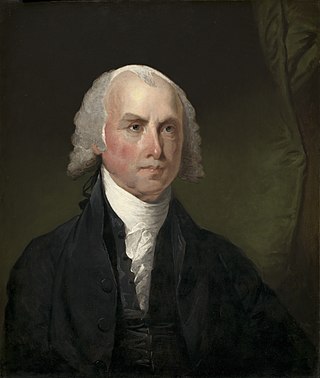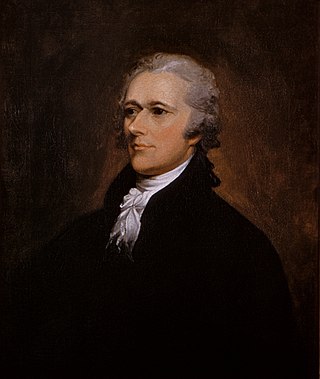
The Federalist Papers is a collection of 85 articles and essays written by Alexander Hamilton, James Madison, and John Jay under the collective pseudonym "Publius" to promote the ratification of the Constitution of the United States. The collection was commonly known as The Federalist until the name The Federalist Papers emerged in the twentieth century.

Federalist No. 12 is an essay by Alexander Hamilton, the twelfth of The Federalist Papers. It was first published in The New York Packet on November 27, 1787 under the pseudonym Publius, the name under which all The Federalist papers were published. It is titled "The Utility of the Union In Respect to Revenue".

Federalist No. 14 is an essay by James Madison titled "Objections to the Proposed Constitution From Extent of Territory Answered". This essay is the fourteenth of The Federalist Papers. It was first published in The New York Packet on November 30, 1787 under the pseudonym Publius, the name under which all The Federalist papers were published. It addresses a major objection of the Anti-Federalists to the proposed United States Constitution: that the sheer size of the United States would make it impossible to govern justly as a single country. Madison touched on this issue in Federalist No. 10 and returns to it in this essay.

Federalist No. 30 is an essay by Alexander Hamilton, the thirtieth of The Federalist Papers. It was first published in the New York Packet on December 28, 1787, under the pseudonym Publius, the name under which all The Federalist papers were published. This is the first of seven essays by Hamilton on the then-controversial issue of taxation. It is titled "Concerning the General Power of Taxation".

Federalist No. 31 is an essay by Alexander Hamilton, the thirty-first of The Federalist Papers. It was first published in The New York Packet on January 1, 1788, under the pseudonym Publius, the name under which all The Federalist papers were published. This is the second of seven essays by Hamilton on the controversial issue of taxation. It is titled "The Same Subject Continued: Concerning the General Power of Taxation".

Federalist No. 32 is an essay by Alexander Hamilton, the thirty-second of The Federalist Papers. It was first published in The Independent Journal on January 2, 1788, under the pseudonym Publius, the name under which all The Federalist papers were published. This is the third of seven essays by Hamilton on the issue of taxation. It is titled "The Same Subject Continued: Concerning the General Power of Taxation".

Federalist No. 33, written by Alexander Hamilton and first published in The Independent Journal on January 2, 1788, continues the focus on the issues in creating an efficient taxation system, along with reassuring the people's doubts about the government control over taxation. Titled "The Same Subject Continued: Concerning the General Power of Taxation", No. 33 explores the idea of allowing Congress to make all laws that are necessary for efficiently operating the national government. Under the pseudonym, Publius, John Jay, Hamilton, and James Madison collectively wrote and published eighty-five essays in the New York newspaper between 1787 and 1788 to promote the ratification of the United States Constitution.

Federalist No. 35 is an essay by Alexander Hamilton, the thirty-fifth of The Federalist Papers. It was first published in The Independent Journal on January 5, 1788 under the pseudonym Publius, the name under which all The Federalist papers were published. This is the sixth of seven essays by Hamilton on the controversial issue of taxation. It is titled "The Same Subject Continued: Concerning the General Power of Taxation".

Federalist No. 34 is an essay by Alexander Hamilton, the thirty-fourth of The Federalist Papers. It was published on January 5, 1788, under the pseudonym Publius, the name under which all The Federalist papers were published. This is the fifth of seven essays by Hamilton on the then-controversial issue of taxation. It is titled "The Same Subject Continued: Concerning the General Power of Taxation".

Federalist No. 38 is an essay by James Madison, the thirty-eighth of The Federalist Papers. It was first published by The Independent Journal on January 12, 1788, under the pseudonym Publius, the name under which all The Federalist papers were published. Madison continues his topic from Federalist No. 37, the political questions examined by the constitutional convention. The essay is titled "The Same Subject Continued, and the Incoherence of the Objections to the New Plan Exposed". In it Madison argues that despite the many objections to the Constitution, it is still a vast and necessary improvement over the Articles of Confederation.

Federalist No. 41, titled "General View of the Powers Conferred by the Constitution", is an essay written by James Madison as the forty-first of The Federalist Papers. These essays were published by Alexander Hamilton, with John Jay and James Madison serving as co-authors, under the pseudonym "Publius." No. 41 was first published by The New York Packet on January 19, 1788 and argues about the necessity of the powers the Constitution vested upon the general government as well as the meaning of the phrase "general welfare".

Federalist No. 52, an essay by James Madison or Alexander Hamilton, is the fifty-second essay out of eighty-five making up The Federalist Papers, a collection of essays written during the Constitution's ratification process, most of them written either by Hamilton or Madison. It was published in the New York Packet on February 8, 1788, with the pseudonym Publius, under which all The Federalist papers were published. This essay is the first of two examining the structure of the United States House of Representatives under the proposed United States Constitution. It is titled "The House of Representatives".

Federalist Paper No. 54 is an essay by James Madison, the fifty-fourth of The Federalist Papers. It was first published by The New York Packet on February 12, 1788 under the pseudonym Publius, the name under which all The Federalist papers were published.

Federalist No. 60 is an essay by Alexander Hamilton, the sixtieth of The Federalist Papers. It was first published by The New York Packet on February 23, 1788, under the pseudonym Publius, the name under which all The Federalist papers were published. This is the second of three papers discussing the power of Congress over the election of its own members. It is titled "The Same Subject Continued: Concerning the Power of Congress to Regulate the Election of Members".

Federalist No. 66 is an essay by Alexander Hamilton, the sixty-sixth of The Federalist Papers. It was published on March 8, 1788, under the pseudonym Publius, the name under which all The Federalist papers were published. The title is "Objections to the Power of the Senate To Set as a Court for Impeachments Further Considered".

Federalist No. 73 is an essay by the 18th-century American statesman Alexander Hamilton. It is the seventy-third of The Federalist Papers, a collection of articles written to promote the ratification of the United States Constitution. It was published on March 21, 1788, under the pseudonym Publius, the name under which all The Federalist papers were published. Its title is "The Provision For The Support of the Executive, and the Veto Power", and it is the seventh in a series of 11 essays discussing the powers and limitations of the Executive branch of the United States government.

Federalist No. 79 is an essay by Alexander Hamilton, the seventy-ninth of The Federalist Papers. It was published in a book collection on May 28, 1788, but first appeared in a newspaper, where most readers would have seen it, on June 18 of that year. It appeared under the pseudonym Publius, the name under which all The Federalist papers were published whether they were written by Hamilton, John Jay, or James Madison. Its title is "The Judiciary Continued", and it is the second in a series of six essays discussing the powers and limitations of the judicial branch.

Federalist No. 81 is an essay by Alexander Hamilton, the eighty-first of The Federalist Papers. It was published on June 25 and 28, 1788 under the pseudonym Publius, the name under which all The Federalist papers were published. The title is "The Judiciary Continued, and the Distribution of the Judicial Authority", and it is the fourth in a series of six essays discussing the powers and limitations of the Judicial branch.

Federalist No. 82 is an essay by Alexander Hamilton, the eighty-second of The Federalist Papers. It was published on July 2, 1788, under the pseudonym Publius, the name under which all The Federalist papers were published. Its title is "The Judiciary Continued", and it is the fifth in a series of six essays discussing the powers and limitations of the judicial branch of government.

Federalist No. 83 is an essay by Alexander Hamilton, the eighty-third of The Federalist Papers. It was published on July 5, 9, and 12, 1788, under the pseudonym Publius, the name under which all The Federalist papers were published. Titled "The Judiciary Continued in Relation to Trial by Jury", it is the last in a series of six essays discussing the powers and limitations of the judicial branch.




